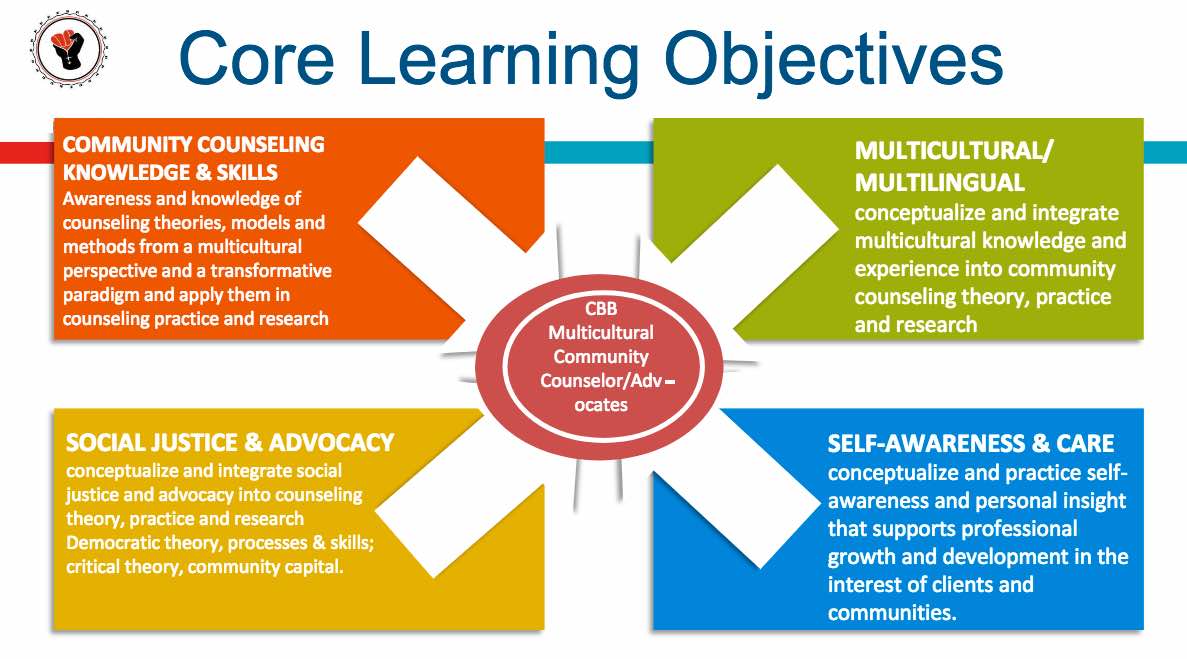What Is CBB?
- A 2-year, 60-unit intensive professional counselor preparation program that meets all of the requirements for the Master of Science in Counseling, plus up to 15 additional units for the Multicultural Community Counseling specialization
- Designed to provide learners with the education and experience necessary to prepare for LPCC (Licensed Professional Clinical Counselor) licensure, as well as doctoral studies in counseling and education
- Also intended for persons who want to increase their understanding of human behavior, multicultural issues and interpersonal skills — especially those working or planning to work in counseling positions that may not require specific licensure or state credentials
Many CBB graduates have also used this degree to qualify for student services positions in community colleges and universities
- Inequality continues to grow in U.S. society and is increasing societal ills, including mental health issues
- SoCAL is one of the most diverse areas in the U.S.
- Over 2 million Californians are affected by mental & emotional illness annually
- Untreated mental illness is leading cause of disability and suicide & imposes high costs on communities
- High vacancy rate for culturally competent community-based counselors
- Under 30% of counselors are ethnically or culturally diverse or come from the marginalized communities they serve
- Build a multicultural learning community composed of highly diverse individuals — many from disadvantaged backgrounds
- Develop a healthy learning environment for all of its members, where faculty and students work as partners in the learning process
- Collaboratively develop syllabi that emerge from community needs and the tasks the community sets out to perform in the communities we serve and at field sites, including the community counseling clinic
In this context, students learn:
- Counseling and community-building skills
- Critical self-awareness
- Awareness of one’s effects on others
- Empathy
- Emotional stamina and resilience
Creating an environment very similar to what communities face: one that is filled with ambiguity, disequilibrium, tension, and conflict . . . Learning communities create an environment of love, compassion, appreciation, support and empathetic alliances.
- Sense of belonging is recognized as an important determinant of psychological and physical well-being
- Traditional counseling models train practitioners to work one-on-one with people with the idea that the individual is the locus of the problem. In CBB, we work instead within a whole social context, with a whole community, and support counselors in becoming sources of support for each other, individuals, and communities.
- Community interventions play an important role in successful mental health treatment
- Social Isolation = mental illness
- People need to learn to work together in community in order to thrive and survive
- In cross-cultural community, people learn relational and life skills that many have never learned and participate in a social ritual
- Founded in 1973 by Dr. Dave Malcolm
- Dr. Maria Nieto Senour – 38 years of service, including program director for many years.
- Partners-in-Learning Community Pedagogy: Each One, Teach One. Si Se Puede — Yes, We Can!
- In Fall 2014, the 1-year CBB Program became a 2-year program to prepare students to become Licensed Professional Clinical Counselors (LPCC).
- See a video and photo album from our 40-Year Anniversary Celebration!
The 60-unit M.S. in Counseling
The 60-unit M.S. degree is designed to provide the student with the education and experience necessary to prepare for LPCC licensure examinations, doctoral studies, or other advanced graduate studies. It is also intended for persons who want to increase their understanding of human behavior and their interpersonal skills. This degree will also qualify graduates for student services positions in community colleges and universities. 15 additional units are required for the multicultural community counseling specialization.

Democratic Learning Community
The CBB program is designed to enable each student to participate in the building
of a learning community to which each member contributes according to her/
- To help meet the counseling needs of the growing populations of diverse groups by training students from these populations.
- To develop a baseline of cross-cultural knowledge, awareness and advocacy for each student in the program.
- To develop counseling interventions and methodologies which are culture/
life orientation appropriate for the needs of the various underrepresented populations needing to be served. - To develop critical analyses for existing counseling theories as they apply to non-mainstream populations.
- To help place each participant into a field setting which will enhance her/
his development as well as use the unique skills the participant already possesses.